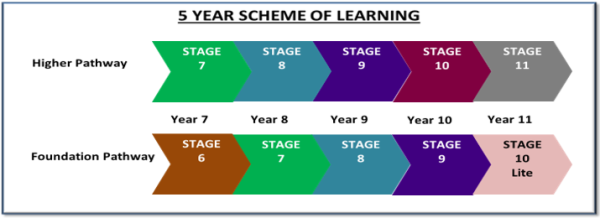Maths
Curriculum Intent
The Mathematics faculty use a mastery approach to teaching to ensure pupils develop a deep understanding of all topics. Teachers use varied questioning and interesting tasks to ensure pupils develop a life-long interest in Mathematics. Pupils are given further practice when necessary and extension work is always ready for pupils who grasp topics quickly. Extra support is provided for pupils that find any of the work difficult. Pupils are trained to be excellent problem solvers and understand the importance of good Mathematics skills to succeed in other subjects. All pupils leave school ready to tackle everyday tasks, employment and further education.
How knowledge and skills build through Key Stage 3
The Mathematics faculty use clear explanations, a variety of rich tasks, problem solving activities and games to ensure pupils engage in lessons. Teachers use varied questioning to make pupils think and encourage them to develop problem solving strategies. We routinely revisit topics through ‘do it now activities’ at the start of lessons to ensure pupils can recall information they have been taught previously and develop a long term understanding of all topics. The progressive nature of our scheme of work also means we regularly return to topics. All teachers go over the information that has been taught previously before moving on to new work (please click on this link for a document that shows how topics progress over the years). Pupils are shown how to revise for assessments and material is provided to help them do this.
How it builds on the Key Stage 2 primary curriculum
In Math’s lessons we build on the number and shape and space work developed in Key Stage 2 and introduce pupils to algebra, ratios and data handling. Pupils are set in Mathematics from early in Year 7. Initial classes are decided using a combination of KS2 results and our own baseline assessments. Depending on your child’s math’s ability they are placed on either the Foundation or Higher pathway as show in the diagram below. Most pupils on the Higher Pathway will take the Higher Mathematics GCSE paper in Year 11, most pupils on the Foundation Pathway will take the Foundation Mathematics GCSE paper.

We regularly assess pupils progress and there is always the opportunity to move between sets, particularly during Key Stage 3.
Link to Key Stage 4 GCSE curriculum
All pupils take the Pearson Edexcel Mathematics GCSE, this link will take you to the course specification:
Maths GCSE | Edexcel GCSE Mathematics (2015) | Pearson qualifications
Beyond Kingshill – Post 16 and careers
Good Mathematics skills and qualifications are an important requirement for a lot of post 16 courses, jobs and careers. We ensure pupils leave the school fully prepared for these. For more information on jobs that require a good knowledge of Mathematics please click on this link - Jobs that use Maths - Careers - BBC Bitesize
The faculty run an after school Additional Mathematics course to prepare pupils looking to study A Level Mathematics at 6th form or college.
